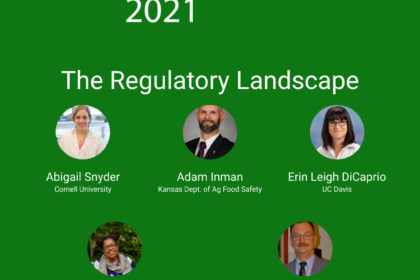
Collaboration with regulators, not confrontation, is the recommended course of action for fermenters, experts suggest.
“Producers are speaking one language and regulators are speaking another,” says Abigail Snyder, assistant professor of microbial food safety at Cornell University. “Producers are like ‘Hey, this has been produced forever and it has a history of safe production!’ That’s not super meaningful for regulators. Regulators are used to this codified framework that is not necessarily built around fermented foods. There’s a middle ground.”
Snyder spoke with a panel of experts on health and safety regulations during TFA’s conference, FERMENTATION 2021. The consensus: food regulations exist to protect the consumer, but complying with myriad national, state and local laws can be difficult and frustrating to navigate, especially for a fermented food or beverage that utilizes novel food processes.
“Don’t be afraid, don’t feel like you’re going to tick off the inspector,” says Adam Inman, assistant program manager for the Kansas Department of Agriculture Food Safety & Lodging Program. He advises producers to always ask regulators for help. “Even if we start with your recipe and your process and we just document that, that can go a long way as a starting point.”
Jonathan Wheeler, coordinator for special processes at retail for the South Carolina Department of Health & Environmental Control, says if you’re dealing with a regulator unfamiliar with fermentation, ask for a supervisor. Wheeler manages South Carolina’s team of 80-90 regulators and points out that a health inspection should be an education opportunity for the regulator, too.
“We are partners on the same team, just in different roles,” Wheeler says. “Our approach in South Carolina has been driven by the need to educate as well as regulate. You have a voice, it’s part of collaboration and inspectors…are open to input [from producers].”
Still, compliance is not without its challenges.
Soirée-Leone, writer, homesteader and local food advocate, says that food inspection is one of the biggest challenges for smaller producers — especially in rural areas, where resources can be limited. For example, in Tennessee where she lives, home-based food businesses can sell their goods at farmers markets, as long as those items don’t need to be refrigerated. But there’s no rule for food that needs to be frozen,, so producers are allowed by the health department to sell popsicles.
“It’s very challenging, and a lot of people get very frustrated in the process,” she says.
Erin Leigh DiCaprio, assistant professor of cooperative extension at University of California, Davis, notes that regulations differ from state to state — a ferment produced under cottage food laws in one state could need a processed food license in another. She points out every state or county has an extension educator like herself who has the needed technical expertise to work with producers and regulators. DiCaprio specifically works with smaller-scale processors to navigate regulations in California.
Could the U.S. learn from other countries?In Korea, Japan and China, fermented foods and drinks are common, yet regulations are minimal.
“There’s a cultural aspect there… not necessarily advocating eliminating regulations but saying that a culture — and no pun intended in this case — but a culture that’s been used to eating fermented foods for years and had no negative impact. Is there some education to be learned from that?” questions Neal Vitale, the moderator and executive director of TFA.
“We should not be as regulators in a position of trying to jam fermentation processes… into a mold where they all look the same — because they don’t,” Wheeler says. “Educate me as how you want that process to look.”
